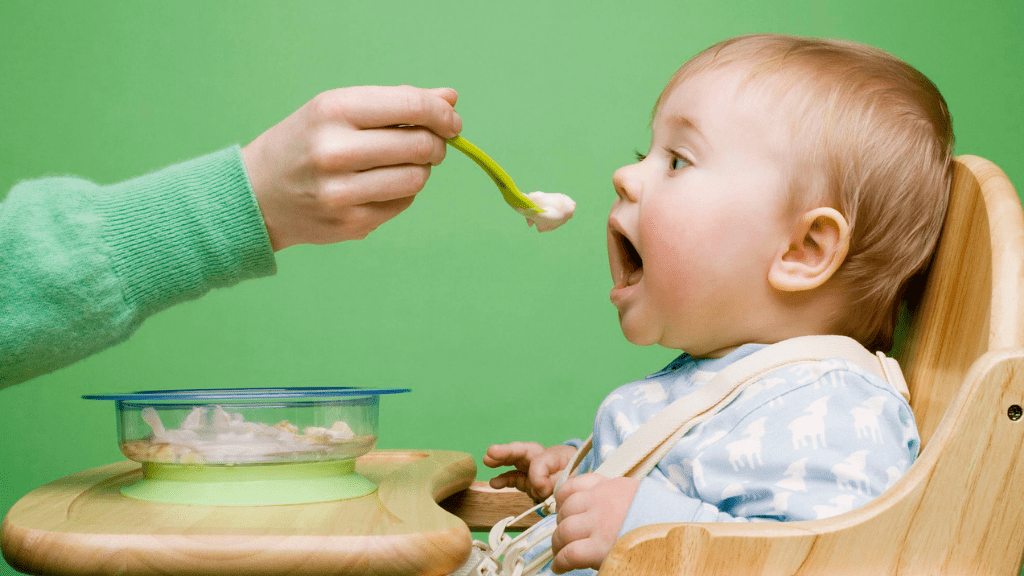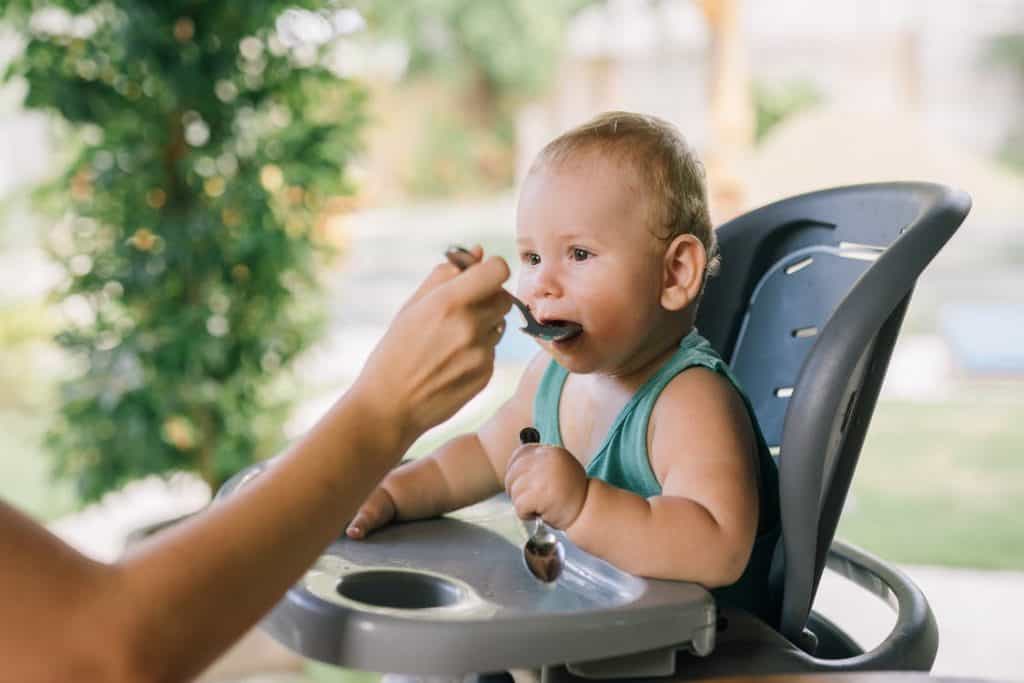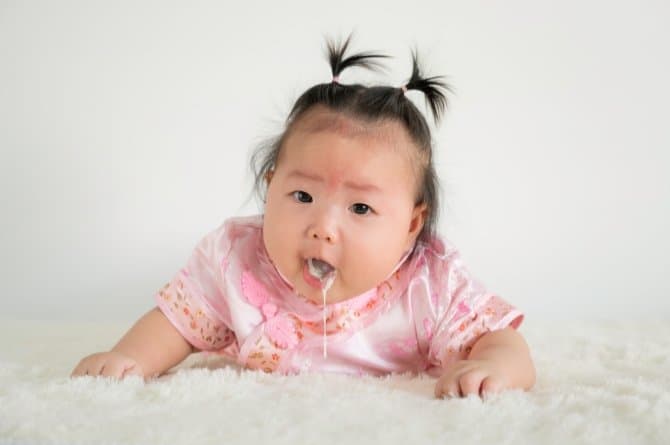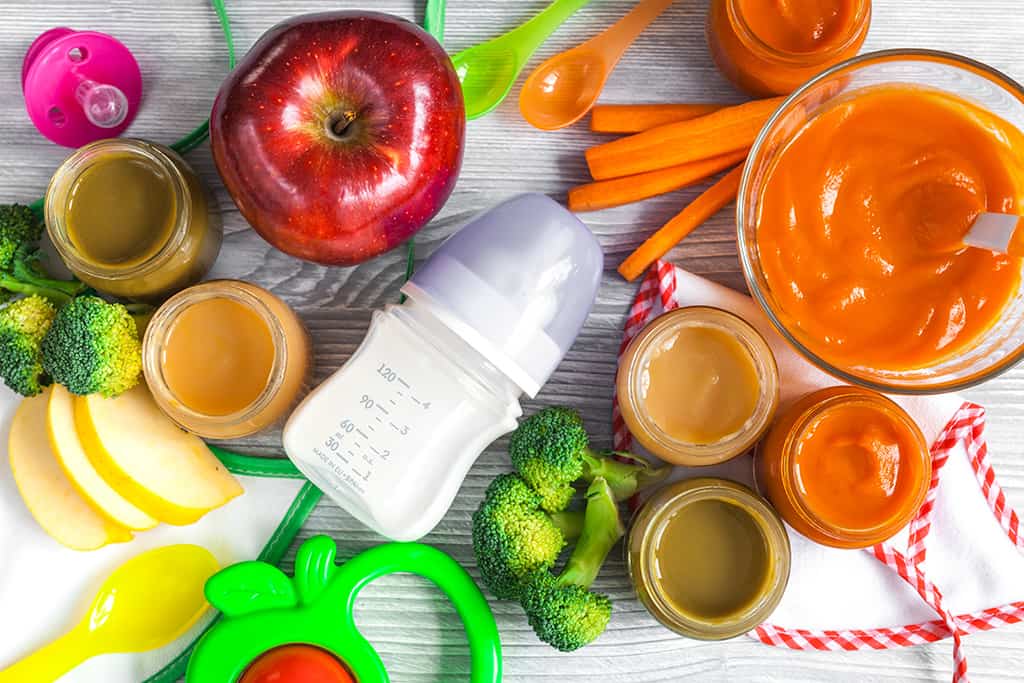
Table of Contents
Food allergies in babies are difficult to spot and the only way to be assured of it is to get a formal diagnosis from a certified healthcare provider. Now, what does a food allergy look like in a baby? Some of these symptoms might be mild and will cease within a few days. For instance, babies will experience nasal stuffiness, coughing, or itching when they have a food allergy but symptoms like uneasy breathing are severe and require immediate medical care.
Here in this article, we have solved some of your queries that arise when you suspect food allergy in your baby.
Do Babies Have Food Allergies?
Absolutely yes. Babies with a close family member prone to food allergies tend to be more exposed to contracting one. About 3% of infants and 9% of one-year-olds tend to be allergic to at least one food. Babies can also have an allergic reaction from consuming breast milk containing proteins from any of the problematic foods. Here’s a list of all the symptoms you can look out for.
| Body part | Symptoms | Severity? |
| Eyes | Swelling, watering, itching | No |
| Nose | Sneezing, itching, runny, stuffy | No |
| Mouth | Itching and swelling | No |
| Throat | Swelling, coughing, hoarseness | Sometimes |
| Lungs | Wheezing, difficult breathing | Yes |
| Heart | Loss of consciousness, pale skin, low blood pressure | Yes |
| Digestion | Diarrhea, reflux, abdominal pain, vomiting, nausea | No |
| Skin | Swelling, hives, eczema, itching | No |
Mild Symptoms And Signs Of Food Allergies in Babies

Food allergies cause a lot of symptoms such that you might not understand their severity. If your child is too young to tell you, you may not know some of them at all. The key is to take a note of the easily visible signs and check their frequency of appearance and time.
1. Colic
Colic is not a special illness. Kids suffering from this typically exhibit intensive crying for at least 3 hours a day for 3 days a week for at least 3 weeks. Itis typically caused by digestive problems caused by the food you are feeding your child through baby formula or breastfeeding after eating a particular food that the baby is allergic to. Colic symptoms are of the usual pattern so identifying the symptoms will be easy.
- Arched back, clenched fists, stiffened arms, pulled up legs
- Pale skin around the mouth with a red face
- Difficulty being calmed down
- High pitched crying
While a good allergy may cause colic, there are other factors that result in it too such as, overstimulation, a digestive problem, or the inability to self-calm. And there’s no way to distinguish what kind of colic your baby has so pay attention to the symptoms that may occur.
Healthcare providers assert that colic in babies may be due to acid reflux. Study shows a percentage of babies with colic consume cow’s milk. If you go to your pediatrician with this, you will be prescribed reflux medication or may suggest you change the baby formula.
2. Itching
A food allergy will cause itching all over the body but of course your baby won’t be able to show you. An itchy baby will squirm against something to get rid of the itch. They may also get a lot fussy but again an itch is not enough for you to decide that your baby has food allergies. It is just one of the potential symptoms of a food allergy in babies.
3. Eczema
Eczema is the itchy, scaly rash that becomes raw and red over time. It can occur due to a food allergy and will look different depending on your baby’s age. Here’s what you need to know.
- 0 to 6 months: Rashes on the scalp, forehead, chin, and cheeks appear which may spread to other areas as well.
- 6 to 12 months: Rashes appear on the knees and elbows where the skin gets rubbed excessively due to crawling. An infected rash will turn into a yellow crust.
- 2 to 5 years: Rashes occur on the creases of elbows and knees or on the ankles, wrists, and hands. It will look thick, scaly, and dry.
Eczema is rarely found in the diaper area because of the presence of extra moisture. Research showed that there are two things you can do to reduce the severity of eczema flare-ups in your babies for the first 4 months of life:
- Supplementing with hypoallergenic hydrolyzed formula
- Exclusive breastfeeding
To soothe your baby’s skin affected by Eczema, your consulting pediatrician will recommend the following tips. If the itching is severe, you will be use steroid Eczema creams or antihistamine.
- Wet wraps
- Cold compress
- Nonsteroidal skin products like petroleum jelly
- Oatmeal baths
4. Hives
Hives are red or pink bumps with pale centers measuring from half an inch to several inches in diameter. It can be quite itchy with an irregular shape. If your child gets hives in a particular area it is because he or she came in contact with something reactive like pollen or pet saliva
If it is all over your child’s body, it means an infection is at the door. These will disappear from one area and turn up in another. But still, only 3% of the total cases of hives are due to food allergies. Benadryl is the top choice if they are above the age of 1. You should consult your pediatrician if you are unsure what to do.
5. Swelling of Eyes, Lips, And Face (Angioedema)
If your baby’s face swells up and looks puffy, especially around the eyes and lips then they are having an allergic reaction to a particular food. Angioedema can be treated with antihistamines. This is a mild symptom unless you see your baby’s throat and tongue also swelling.
What Is Oral Allergy Syndrome in Babies?
Some babies develop swelling, itching or hives around their mouths after eating raw vegetables and fruits which is called OAS (Oral Allergy Syndrome). It is a minor reaction and typically occurs because the person is allergic to birch tree pollen. Certain foods also contain this allergen which will trigger the same symptoms.
Digestive Issues

Symptoms of digestive issues caused by food allergies are,
- Abdominal pain: It’s difficult to find this out in a baby but you could look out for excessive crying. Babies also tend to pull their knees to their chest while experiencing abdominal pain.
- Vomiting: Remember to not make your baby lay down if they have been vomiting as they might breathe vomit into their lungs.
- Diarrhea or loose stools: A food allergy will cause diarrhea with blood or mucus.
If your baby seems to have chronic vomiting, blood, or mucus in their diaper, it’s time to contact your health-care provider for diagnosis. They will suggest you switch to prescribed hydrolyzed formulas. Remember to keep your baby hydrated as vomiting and/or diarrhea will make your baby lose a lot of body water. If they show signs of dehydration, get medical help ASAP. Look out for these dehydration symptoms,
- Cold feet and hands
- Deep, rapid breathing
- Dry, wrinkly skin
- Sunken soft spot
- Sunken eyes
- Fewer wet diapers (the normal count is 6 per day)
- Dry tongue and lips
- No tears when they cry
Classic Symptoms of Food Allergies in Babies
Here are the basic allergy symptoms to look out for in your baby.
- Itchy and watery eyes
- Coughing
- Sneezing
- Stuffy and runny nose (this can become chronic and lead to allergic rhinitis)
Severe Food Allergy Reactions In Babies
Anaphylactic shock or anaphylaxis is a severe allergic reaction that can potentially turn life-threatening. It is rare in babies but when it happens, it starts with sudden hives and difficulty in swallowing and breathing. Symptoms appear right after your baby has been introduced to a new formula or food. These symptoms can be common but keep an eye out for these as well:
- Wheezing or difficult breathing: You must listen for rattling or whining sound as they might be gasping for breath or be pursing their lips to breathe.
- Swelling of throat, face, or mouth: All these swelling parts along with impaired swallowing or breathing is a severe symptom.
- Choking: Choking is a sign of respiratory distress.
- Pale and flushed skin: This symptom will be difficult to spot if your baby has hives. It indicates dropping blood pressure.
- Loss of consciousness: When blood pressure goes dangerously low, unconsciousness sets in.
Food Allergies in Babies: When Should You Rush To The Emergency?
Rush your baby to the hospital if he or she,
- Acts or looks sick
- Has slurred speech
- Has unusual drooling
- Has trouble swallowing
- Suddenly coughs with a coarse sound
- Has widespread hives and is under one year
- Develops hives after being exposed to a known allergen, taking medicine, eating shellfish, fish, eggs, or nuts.
When Do Symptoms of Food Allergies Appear in Babies?
Symptoms of food allergy appear on the spot, i.e., soon after the baby consumes the food. Anaphylaxis and hives either separately or together develop within 30 minutes or 2 hours after eating the culprit food. Your baby even can tolerate the food for sometime but then some time later develop a reaction to it.
Foods Likely To Cause Allergy

All kinds of foods can cause an allergic reaction depending on the person’s immune system. However, typically, 90% of food allergies in kids are caused by:
- Milk
- Eggs
- Soy
- Wheat
- Tree nuts
- Peanuts
- Shellfish
- Fish
Most kids allergic to soy, wheat, eggs, or milk outgrow these allergies by the age of 5 while other allergies will take longer and some might even be permanent.
If You Suspect A Food Allergy in Your Baby-
● Keep A Food Diary
Take a note of what your baby drinks and eats along with the time they take their food. Write down if any symptoms appear within the next 2 hours. All symptoms unrelated to foods must also be noted down.
● Check On Treatments
Contact your pediatrician to enquire what allergy medications can be safely fed to your child.
● Consult Your Pediatrician
Keep a regular pediatrician for your child and keep in touch with appointments. If they need further testing they will refer you to an allergist.
How Do You Prevent Food Allergies in Babies?
If you are not allergic to any food then you need to avoid possible allergens as it is not proven that this may prevent allergies in your baby. Breastfeeding has been found to reduce the risk of an allergic reaction in your baby. However, if your baby seems to be allergic to breast milk, it means they are allergic to the proteins from the foods you have eaten as they are passed on to your milk.
It has been proven that breastfeeding between the 4 to 6 months will reduce your baby’s risk of developing eczema, an allergy to cow’s milk, and wheezing. At this age introduce your baby to solid foods with single ingredients like squash baby food, rice cereal, or apple. Try new foods with a gap of a few days in between because then you can find out what kind of foods they are allergic to. Some people avoid giving their baby higher risk foods like peanuts and eggs but experts say it will only increase their risk of developing good allergies.
The Bottom Line
It can be extremely stressful and worrying to have a baby with a food allergy. You are always on high alert with medications and safe diet plans. The good news however is that children usually outgrow food allergies.
FAQs: Food Allergies in Babies
1. How long does it take for a baby to show a food allergy?
2. What is the most common food allergy in infants?
3. How do you test for food allergies in babies at home?
Sources:
Reviewed By:

Jessica - Nutritionist Dietician
Jessica is the owner and registered dietitian nutritionist at Nutrition That Heals, LLC. She started her dietetics career working in acute care where she gained a great deal of invaluable experience, learning all about different disease states and their appropriate nutrition interventions. She then worked in long term care where she was able to develop her skills and knowledge base dealing with the elderly population. Following long term care, she worked as an outpatient dialysis dietitian, working with patients to help them eat their best for their kidney failure and often other health conditions (diabetes, heart disease, etc.). She then made the jump back to be an inpatient clinical dietitian. There, she was able to work with patients with strokes, cancer, orthopedic issues, as well as the pediatric population. During her most recent time working as an inpatient clinical dietitian, a great opportunity presented itself and it was a great way to move into focusing more on her dream of opening a private practice. She currently works full time as a contract dietitian with Dietitians on Demand conducting 1:1 nutrition counseling sessions while also working with patients here at Nutrition That Heals, LLC. She has been grateful enough to know how powerful good nutrition can be, but after being diagnosed with endometriosis in March 2022, she had to fully focus on the importance of anti-inflammatory foods, proper hydration, and self-care. This diagnosis motivated her to put pen to paper and get her business started - she wanted to teach what she had learned to others - food should be nourishing. Jessica wants to show you how you can heal with good nutrition, and feel your absolute best!
On behalf of the editorial team at Parenthoodbliss, we follow strict reporting guidelines and only use credible sources, along with peer-reviewed studies, academic research institutions, and highly respected health organizations. To learn about how we maintain content accurate and up-to-date by reading our medical review and editorial policy.










